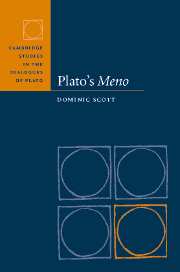Book contents
- Frontmatter
- Contents
- Acknowledgements
- Introduction
- Part I
- Part II
- Part III
- Chapter 11 The method of hypothesis: 86c–87c
- Chapter 12 Virtue is teachable: 87c–89c
- Chapter 13 Virtue is not teachable: 89e–96d
- Chapter 14 Virtue as true belief: 96d–100b
- 15 Irony in the Meno: the evidence of the Gorgias
- Chapter 16 Meno's progress
- Conclusion
- Appendices
- References
- Index of ancient passages
- General index
Chapter 16 - Meno's progress
Published online by Cambridge University Press: 29 September 2009
- Frontmatter
- Contents
- Acknowledgements
- Introduction
- Part I
- Part II
- Part III
- Chapter 11 The method of hypothesis: 86c–87c
- Chapter 12 Virtue is teachable: 87c–89c
- Chapter 13 Virtue is not teachable: 89e–96d
- Chapter 14 Virtue as true belief: 96d–100b
- 15 Irony in the Meno: the evidence of the Gorgias
- Chapter 16 Meno's progress
- Conclusion
- Appendices
- References
- Index of ancient passages
- General index
Summary
On pages 60–65 above, I claimed that Plato draws an extremely vivid portrait of Meno's character throughout the work, and has Socrates attempt to reform it as the conversation goes on. One of his main stratagems is to use the slave boy and Anytus as object lessons from which Meno is supposed to learn. I now wish to examine the last section of the dialogue, 96d onwards, to see whether Socrates ultimately has any success.
Let us turn back to the point where Anytus leaves Socrates and Meno to continue the discussion as to whether virtue is teachable. After concluding that it is not (95b1–96c10), Socrates introduces the distinction between knowledge and true belief (96d1–98b6); finally they agree that virtue is true belief, not knowledge, and comes not by teaching but by divine dispensation (98b7–100c2). What I wish to show is that throughout this passage Meno's behaviour as an interlocutor undergoes a marked change, especially in comparison to the first ten pages of the dialogue.
He is much milder and more co-operative. There are certainly no abrupt or peremptory demands, nor any obstructions. At no point does Socrates need to comment on his failings, even light-heartedly. The third section (98b7–100c2) is a particularly striking contrast to Meno's behaviour in the first part of the dialogue: in all his answers he agrees straightforwardly with Socrates.
- Type
- Chapter
- Information
- Plato's Meno , pp. 209 - 213Publisher: Cambridge University PressPrint publication year: 2006



